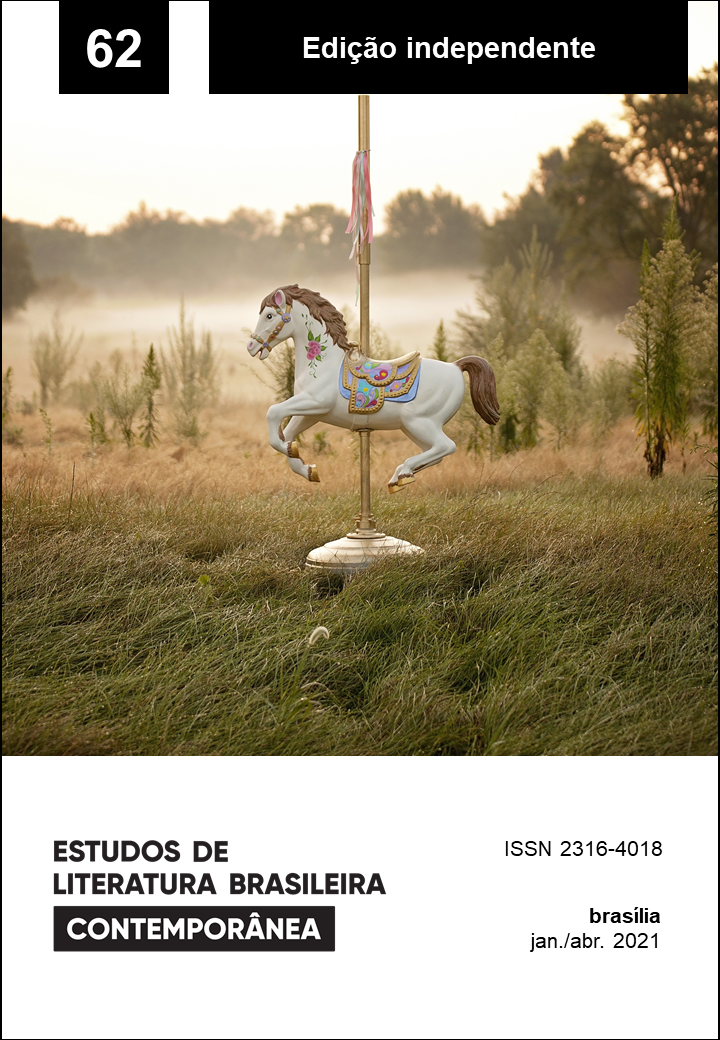Beasts Made of Thought: Renato Suttana’s Meditative Lyric
DOI:
https://doi.org/10.1590/2316-40186214Keywords:
Renato Suttana, bestiary, phenomenology, poetryAbstract
Restricted to the limited circle of small publishing houses, Renato Suttana’s poetry shows a high level of formal acuity and boldness of thought. One of its main features is the practice of poetic bestiaries. The beasts that appear in Sutanna’s books are situated – as we argue throughout the paper – by a phenomenological perspective that displaces them from the course of time in order to better apprehend them. This procedure achieves a higher level of complexity with the fixation on entirely imaginary beings: in this case, the question of the possibility to represent animals becomes a question about the purpose of poetry.
Downloads
References
ABBAGNANO, Nicola (2012). Dicionário de filosofia. 6. ed. São Paulo: WMF Martins Fontes.
CAVALCANTI, Geraldo Holanda (2012). A herança de Apolo: poesia poeta poema. Rio de Janeiro: Civilização Brasileira.
LUCCHESI, Marco (2006). Meridiano celeste & bestiário. Rio de Janeiro: Record.
MACIEL, Maria Esther (2007). Bestiários contemporâneos: animais na poesia brasileira e hispano-americana. Via Atlântica, n. 11, p. 145-153, jun. Disponível em: http://www.revistas.usp.br/viaatlantica/article/view/50671/54783. Acesso em: 17 dez. 2019.
OLIVEIRA, Eduardo Jorge de; MOREIRA, Maria Elisa Rodrigues (2010). Alguns bestiários na literatura brasileira contemporânea. Revista Crioula, n. 7, p. 1-13, maio. Disponível em: http://www.revistas.usp.br/crioula/article/view/55239/58868. Acesso em: 16 dez. 2019.
SUTTANA, Renato (2002). Visita do fantasma da noite. Guarapuava, PR: Edição do autor.
SUTTANA, Renato (2005a). Bichos. Guarapuava, PR: Edição do autor.
SUTTANA, Renato (2005b). João Cabral de Melo Neto: o poeta e a voz da modernidade. São Paulo: Scortecci.
SUTTANA, Renato (2009a). Fim do verão. Pará de Minas, MG: Virtual Books.
SUTTANA, Renato (2009b). Uma poética do deslimite: poema e imagem na obra de Manoel de Barros. Dourados, MG: UFGD.
SUTTANA, Renato (2011). Outros bichos. Florianópolis, SC: Edições Nephelibata.
SUTTANA, Renato (2012). Opinionautas: a educação dos cavalos falantes. Pará de Minas, MG: Virtual Books.
SUTTANA, Renato (2013). Bichos imaginários. Natal: Sol Negro Edições.
SUTTANA, Renato (2015a). Rapinário. Ilhéus, BA: Mondrongo.
SUTTANA, Renato (2015b). Inundação. Cascais, Portugal: Edições Bicicleta.
SUTTANA, Renato (2016a). Indigestos e purgativos. Dourados, MS: Ars.
SUTTANA, Renato (2016b). Fauna & Cia. Dourados, MS: Ars.
SUTTANA, Renato (2017a). Quando me abriram portas. Ilhéus, BA: Mondrongo.
SUTTANA, Renato (2017b). Altiplano. Florianópolis, SC: Edições Nephelibata.
SUTTANA, Renato (2018a). Música de pianola. Dourados, MS: Ars.
SUTTANA, Renato (2018b). Lições de economia. Dourados, MS: Ars.
WITTGENSTEIN, Ludwig (1968). Tractatus Logico-Philosophicus. Tradução de José Arthur Giannotti. São Paulo: Companhia Editora Nacional; Editora da USP.
Downloads
Published
How to Cite
Issue
Section
License
Copyright (c) 2021 Ronald Silva Robson

This work is licensed under a Creative Commons Attribution-NoDerivatives 4.0 International License.
Authors who publish in this journal agree to the following terms:
a) The authors maintain the copyright and grant the journal the right of first publication, the work being simultaneously licensed under the Creative Commons Attribution License-Non Commercial 4.0 which allows the sharing of the work with acknowledgment of the authorship of the work and publication this journal.
b) Authors are authorized to enter into additional contracts separately, for non-exclusive distribution of the version of the work published in this journal (eg publish in institutional repository or as a book chapter), with authorship recognition and publication in this journal.
c) Authors are allowed and encouraged to publish and distribute their work online (eg in institutional repositories or on their personal page) after the editorial process, as this can generate productive changes, as well as increase the impact and citation of published work (See The Effect of Free Access).
d) The authors of the approved works authorize the magazine to, after publication, transfer its content for reproduction in content crawlers, virtual libraries and the like.
e) The authors assume that the texts submitted to the publication are of their original creation, being fully responsible for their content in the event of possible opposition by third parties.


